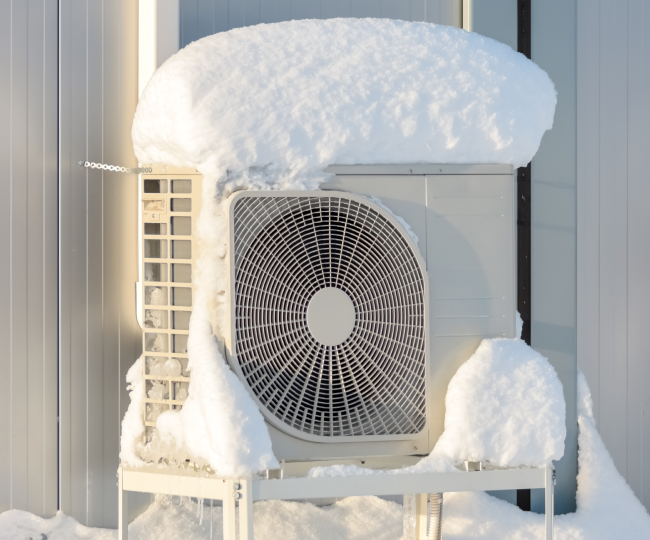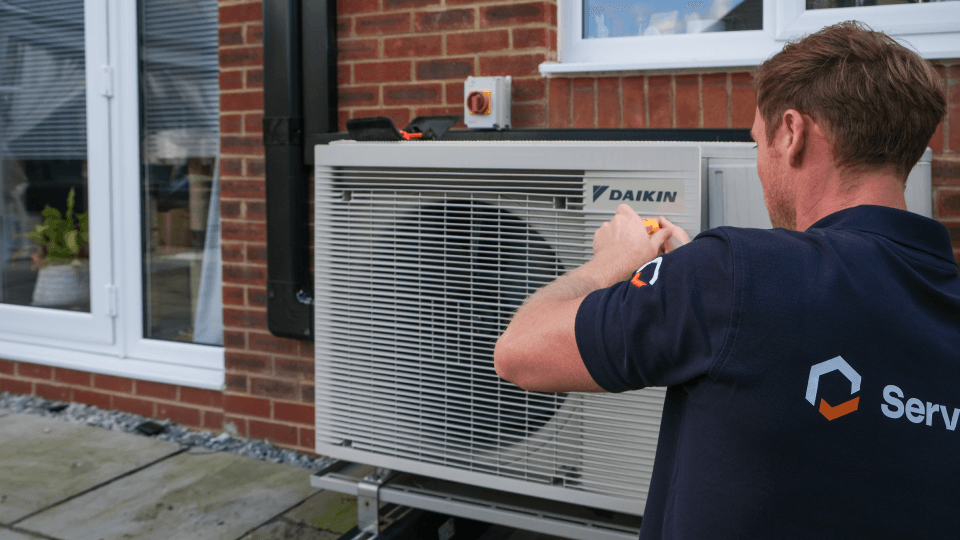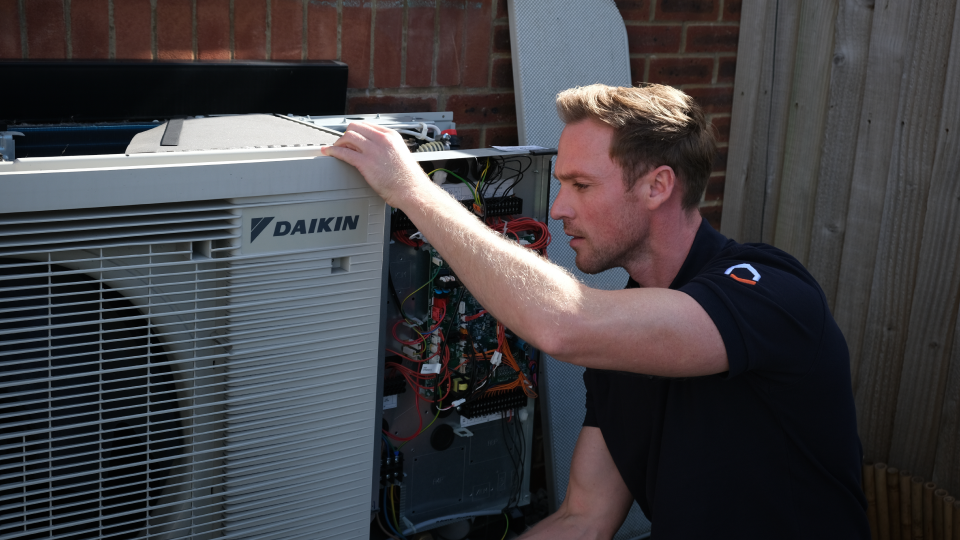Air source heat pumps are one of the most efficient ways to heat a home, but one of the first questions homeowners ask is: how much do they actually cost?
The exact figure depends on your home’s size and insulation, the system’s efficiency, and your heating habits. With electricity still more expensive per unit than gas, some people worry that switching could mean higher energy bills.
Have you been wondering about the running costs of an air source heat pump? We’ll examine what impacts energy bills, how efficient the systems are, and give tips for frugal running costs.

How much does it cost to run?
Most UK households with an air source heat pump spend roughly between £800 and £1,700 per year on running costs. That puts them broadly in line with gas boilers in well-insulated homes, and considerably cheaper than oil or LPG systems in rural properties.
Here’s a quick comparison:
| Heating type | Estimated annual cost (UK average) |
|---|---|
| Air source heat pump | £800 – £1,700 |
| Gas boiler | £630–£1,250 |
| Oil boiler | £1,300+ |
| Electric resistance heating | £2,000+ |
The key thing to remember is that heat pumps are extremely efficient. For every unit of electricity used, 2–4 units of heat are produced. This efficiency helps offset the higher price of electricity, as long as the system is designed and used properly.
What affects the running cost of a heat pump?
Not all air source heat pumps cost the same to run. Your total depends on more than just electricity prices – it’s also about system efficiency, how your home is set up, and how you use the heat pump. Here are the biggest factors:
- Electricity Prices
Electricity is the biggest running cost. While the system is efficient, electricity still costs more per kilowatt hour than gas in the UK.
However, a well-performing heat pump can make up for that with its energy conversion rate – producing multiple units of heat for every single unit of electricity used. The trick is getting the right balance of efficiency and energy tariff.
- System efficiency (COP and SCOP)
Heat pumps are rated by their Coefficient of Performance (COP) and Seasonal COP (SCOP) – measuring their efficiency in turning electricity into heat.
- A COP of 3 means the system produces 3kW of heat for every 1kW of electricity
- Modern systems often achieve SCOP values between 2.5 and 4.5 depending on design and conditions
A well-installed, properly maintained system will run more efficiently, costing you less over time.
- Insulation and heat demand
A well-insulated home needs less energy to stay warm. If your walls, loft, floors or windows aren’t well protected, your heat pump will have to work harder (and longer) to maintain the temperature.
Improving your insulation will significantly reduce your heating demand – and ultimately your bills.
- Heating controls and tariff choice
Smart thermostats, zone controls, and optimised flow temperatures help reduce energy use by avoiding overheating or unnecessary cycling.
Pairing your heat pump with a time-of-use tariff (one with cheaper overnight rates) can cut running costs, especially if the system is storing heat effectively.
Are heat pumps cheaper than gas or oil?
In some homes, heat pumps can be slightly more expensive to run than a new, efficient gas boiler, especially if electricity prices are high and the home isn’t well insulated. But that’s not the full picture.
In many cases, air source heat pumps are:
- Cheaper than oil or LPG heating, especially in rural or off-grid areas
- More efficient than older gas systems
- Better value over time, with fewer repairs and lower maintenance needs
- Less exposed to volatile fuel prices, since they run on electricity ,which is increasingly generated from renewables
In well-insulated homes, with proper installation, heat pumps can match or beat gas for running costs, while reducing your home’s carbon footprint.
Some households use hybrid systems, automatically switching between a boiler and a heat pump depending on the weather or tariff. This keeps costs low while reducing reliance on fossil fuels.
Heat pumps may not always be the cheapest option right now, but they’re a smart long-term investment, especially with shifting energy prices and policies.
How to keep running costs as low as possible
The good news? You can easily reduce the cost of running an air source heat pump, without compromising on comfort. Here are the most effective saving tips:
- Improving your insulation
Start here. A well-insulated home holds onto heat for longer, meaning your heat pump doesn’t have to work as hard. Loft insulation, cavity wall insulation, and double glazing all make a noticeable difference.
- Getting regular servicing
Like any heating system, a heat pump runs best when properly maintained. Annual servicing keeps filters clean, refrigerant topped up, and performance optimised – so your system doesn’t waste energy or develop costly faults.
- Setting your flow temperatures wisely
Heat pumps work most efficiently at lower flow temperatures. If your system is running at unnecessarily high temperatures, you’re wasting energy, so ask your installer or engineer to optimise your settings.
- Choosing a heat pump-friendly tariff
Some energy suppliers offer time-of-use or variable tariffs charging less during off-peak hours. If your heat pump has thermal storage, or you can preheat your home during low-cost periods, real savings will follow.
- Add solar PV (if feasible)
Pairing a heat pump with solar panels will help offset your electricity use and reduce your bills further, especially if you’re home during the day and can use the energy as it’s generated.
What’s likely to change in the future?
While electricity is currently more expensive per unit than gas, the landscape is shifting, which could mean lower running costs for heat pump owners in the coming years.
Here’s what’s on the horizon:
- More renewable electricity: as the UK grid becomes greener, electricity costs could fall, and using a heat pump will be even more environmentally sound.
- Fairer energy pricing: The government is under pressure to rebalance energy levies, which currently put cost burdens on electricity rather than gas. Running a heat pump could therefore become significantly cheaper.
- Smarter controls and tariffs: more suppliers are launching heat pump-friendly tariffs, and smart home technology will be able to optimise energy use.
- Greater public support: With net-zero targets in place, support for heat pump adoption is likely to grow, with more grants, incentives, or low-rate financing likely for energy-efficient upgrades.
In short, while heat pumps are already efficient, they’re fast becoming a more cost-effective choice.
Efficient heating without the guesswork
Running a heat pump doesn’t have to be expensive, especially if your system is well-matched to your home, properly maintained, and paired with smart energy habits.
With expert support, the right servicing plan, and a few simple adjustments, most households can enjoy low-carbon heating to keep costs and emissions under control.
Want to get more out of your heat pump and keep running costs in check?
Get in touch with ServiceMy for expert advice, servicing, and support tailored to your system.
Schedule Your Heat Pump Service Today
Don’t wait until efficiency drops, or your pump encounters issues. Investing in routine maintenance for your air source heat pump is the best way to keep your household energy-efficient, cosy, and cost-effective year-round.
Get in touch with our professional servicing team today to schedule your appointment. With extensive experience in heat pump servicing and home energy solutions, we’re here to help you stay warm, save money, and protect your investment.
Maintain your heat pump, and it will reward you with years of efficient and reliable performance!



